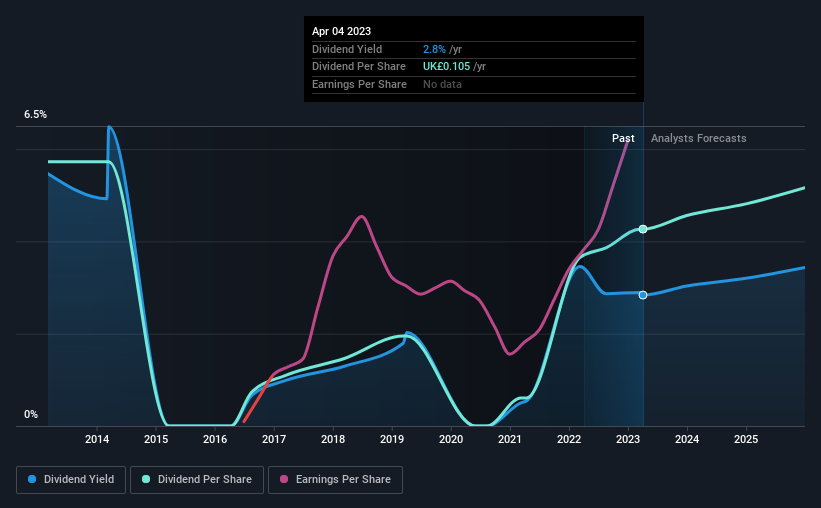
Balfour Beatty plc's (LON:BBY) dividend will be increasing from last year's payment of the same period to £0.07 on 5th of July. Despite this raise, the dividend yield of 2.8% is only a modest boost to shareholder returns.
See our latest analysis for Balfour Beatty
Balfour Beatty's Dividend Is Well Covered By Earnings
Even a low dividend yield can be attractive if it is sustained for years on end. However, prior to this announcement, Balfour Beatty's dividend was comfortably covered by both cash flow and earnings. This means that most of what the business earns is being used to help it grow.
Over the next year, EPS is forecast to fall by 19.9%. If the dividend continues along the path it has been on recently, we estimate the payout ratio could be 32%, which is comfortable for the company to continue in the future.

Dividend Volatility
Although the company has a long dividend history, it has been cut at least once in the last 10 years. The dividend has gone from an annual total of £0.141 in 2013 to the most recent total annual payment of £0.105. Doing the maths, this is a decline of about 2.9% per year. A company that decreases its dividend over time generally isn't what we are looking for.
The Dividend Looks Likely To Grow
Growing earnings per share could be a mitigating factor when considering the past fluctuations in the dividend. Balfour Beatty has impressed us by growing EPS at 16% per year over the past five years. A low payout ratio and decent growth suggests that the company is reinvesting well, and it also has plenty of room to increase the dividend over time.
Balfour Beatty Looks Like A Great Dividend Stock
In summary, it is always positive to see the dividend being increased, and we are particularly pleased with its overall sustainability. The distributions are easily covered by earnings, and there is plenty of cash being generated as well. However, it is worth noting that the earnings are expected to fall over the next year, which may not change the long term outlook, but could affect the dividend payment in the next 12 months. All in all, this checks a lot of the boxes we look for when choosing an income stock.
Market movements attest to how highly valued a consistent dividend policy is compared to one which is more unpredictable. Meanwhile, despite the importance of dividend payments, they are not the only factors our readers should know when assessing a company. Case in point: We've spotted 3 warning signs for Balfour Beatty (of which 1 is concerning!) you should know about. Looking for more high-yielding dividend ideas? Try our collection of strong dividend payers.
Valuation is complex, but we're here to simplify it.
Discover if Balfour Beatty might be undervalued or overvalued with our detailed analysis, featuring fair value estimates, potential risks, dividends, insider trades, and its financial condition.
Access Free AnalysisHave feedback on this article? Concerned about the content? Get in touch with us directly. Alternatively, email editorial-team (at) simplywallst.com.
This article by Simply Wall St is general in nature. We provide commentary based on historical data and analyst forecasts only using an unbiased methodology and our articles are not intended to be financial advice. It does not constitute a recommendation to buy or sell any stock, and does not take account of your objectives, or your financial situation. We aim to bring you long-term focused analysis driven by fundamental data. Note that our analysis may not factor in the latest price-sensitive company announcements or qualitative material. Simply Wall St has no position in any stocks mentioned.
About LSE:BBY
Balfour Beatty
Balfour Beatty plc finances, develops, builds, maintains, and operates infrastructure in the United Kingdom, the United States, and internationally.
Excellent balance sheet second-rate dividend payer.
Similar Companies
Market Insights
Community Narratives


